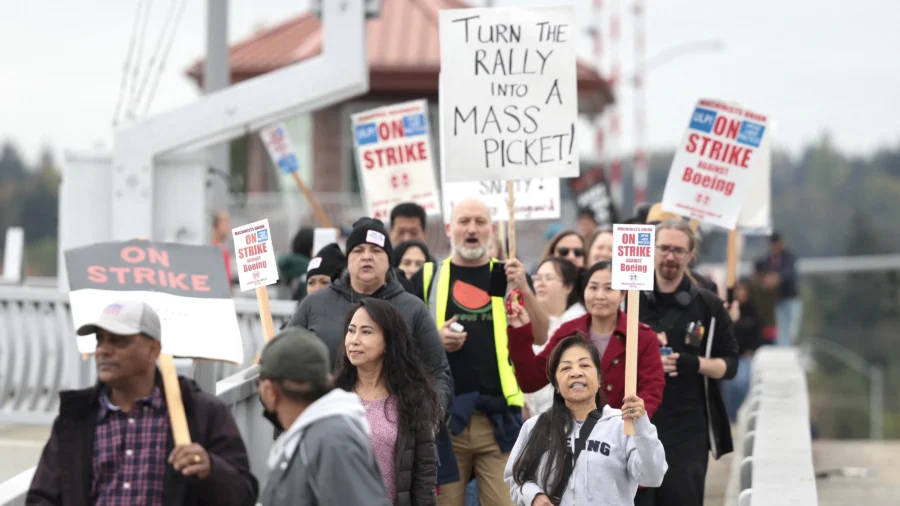Boeing and the union representing striking machinists have reached a tentative agreement that union leaders say should be presented to members for a ratification vote, paving the way for a potential end to the more than month-long strike.
“With the help of Acting U.S. Secretary of Labor Julie Su, we have received a negotiated proposal and resolution to end the strike, and it warrants presenting to the members and is worthy of your consideration,” the International Association of Machinists and Aerospace Workers Local 751 said in a statement on Oct. 19.
Around 33,000 of Boeing’s unionized workers walked off the job on Sept. 13 after nearly 95 percent of the mostly West Coast workers rejected Boeing’s offer of a 25 percent pay hike over four years. The strike halted production of the company’s 737 Max, as well as the 767 and 777 widebody aircraft, with the company losing an estimated $1 billion per month due to the labor action.
Union leaders said the tentative deal features “key improvements” over an earlier Sept. 12 proposal that are “aimed at resolving the strike.” The latest proposal includes a 35 percent wage increase over four years, a $7,000 ratification bonus, and reinstated incentive payouts. It also includes improved 401k contributions, a $105 pension multiplier, and restored call-in provisions.
While Boeing’s latest proposal makes a number of concessions, it does not include a dedicated pension plan for new members, which was a key demand in previous negotiations. Instead, it emphasizes enhanced 401k contributions, including a 100 percent company match up to 8 percent and a one-time $5,000 contribution for eligible members.
The union said it plans to hold a vote on the proposal on Oct. 23 that, if approved by a simple majority of members, will cement the tentative deal into a contract and end the strike.
Union leaders said they are still finalizing the strike settlement agreement and, along with additional contract details, will present it to members for their consideration ahead of Wednesday’s vote.
“The future of this contract is in your hands,” they said.
Boeing did not immediately respond to a request for comment.
The strike began at a challenging time for Boeing, which has been trying to ramp up production after a series of safety incidents and increased regulatory scrutiny in recent years. Analysts have warned that a prolonged strike could lead to lasting financial impacts, while credit-rating agencies have warned of potential ratings downgrades.
Shortly after the strike began in mid-September, the plane maker announced a hiring freeze, a halt to nonessential spending, and teased the possibility of layoffs, in a bid to conserve cash and preserve the company’s long-term operations. At the time, Boeing also said it will temporarily release nonessential contractors and consultants, and pause employee retention programs, catered meals, and team events.
As the strike dragged into October, Boeing announced that it will cut around 17,000 jobs and further delay the launch of the 777X, a new model that is already several years behind schedule.
“Our business is in a difficult position, and it is hard to overstate the challenges we face together,” Boeing CEO Kelly Ortberg said in an Oct. 11 memo to employees, which came on the same day that the plane maker announced in a press release that it expects to recognize negative impacts to its financial results when it reports third-quarter earnings on Oct. 23.
Boeing attributed the impacts to charges related to certain commercial and defense programs, as well as the ongoing strike. The company now projects revenues of $17.8 billion, an operating cash flow deficit of $1.3 billion, and a loss of $9.97 per share.
From The Epoch Times

